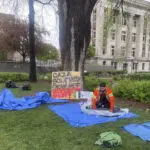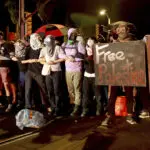A for-profit college accused of targeting women and Black students with false advertising about how long it would take to complete a degree, then extracting millions of dollars in extra tuition payments, agreed to a $28.5 million settlement announced Thursday.
The class-action lawsuit alleged that Walden University generated millions of dollars in excess tuition and fees by prolonging projects required for Doctorate in Business Administration degrees.
“Students alleged that Walden masked deception as diversity by targeting their DBA degrees at Black and female students who were hoping to advance their careers,” said Aaron Ament, president of the National Student Legal Defense Network, which filed the lawsuit in U.S. District Court in Maryland with civil rights law firm Relman Colfax.
Walden is the latest for-profit college to face repercussions over allegedly misleading students about costs. Other for-profit schools have faced action from the federal government over accusations of deception, including Ashford University and DeVry.
Walden, an online university, said in a written statement that it agreed to the settlement “in pursuit of the best interests of all parties involved.” The school said it remained committed to helping students with their professional goals.
In total, the lawsuit estimates Walden extracted over $28 million in excess tuition and fees from students. It alleged that Walden misrepresented how long it would take to complete the doctoral degree and the number of credits required, specifically for a capstone project component of the program.
In the proposed settlement, which requires court approval, Walden also agreed to disclose cost and completion time on its website and restructure its dissertation committees. An estimated 3,000 students would be eligible to request compensation under the settlement, said Tara Ramchandani, a lawyer for the plaintiffs.
The National Student Legal Defense Network argued the school's tactics amounted to “reverse redlining,” a reference to housing discrimination practices that disproportionately target minorities, by its focus on attracting women and Black students into the program.
For example, Walden disproportionately targeted its advertising towards predominantly Black cities, according to the lawsuit. Forty-one percent of students in the university's doctoral programs were Black, seven times the national average, according to the student defense network.
Ament said the case was one of the first where a federal court ruled that reverse redlining protections could be applied to higher education.
___
The Associated Press’ education coverage receives financial support from multiple private foundations. AP is solely responsible for all content. Find AP’s standards for working with philanthropies, a list of supporters and funded coverage areas at AP.org.






























